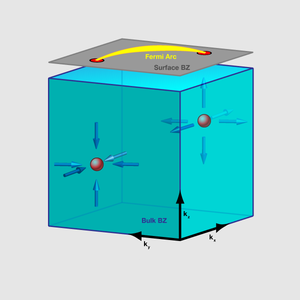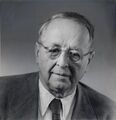Weyl semimetal (nonfiction): Difference between revisions
No edit summary |
|||
| Line 22: | Line 22: | ||
== Fiction cross-reference == | == Fiction cross-reference == | ||
* [[Crimes against physical constants]] | |||
* [[Gnomon algorithm]] | |||
* [[Gnomon Chronicles]] | |||
== Nonfiction cross-reference == | == Nonfiction cross-reference == | ||
| Line 31: | Line 35: | ||
* [https://en.wikipedia.org/wiki/Weyl_semimetal Weyl Semimetal] @ Wikipedia | * [https://en.wikipedia.org/wiki/Weyl_semimetal Weyl Semimetal] @ Wikipedia | ||
[[Category:Nonfiction (nonfiction)]] | [[Category:Nonfiction (nonfiction)]] | ||
[[Category:Physics (nonfiction)]] | [[Category:Physics (nonfiction)]] | ||
Latest revision as of 07:54, 16 May 2019
A Weyl semimetal is a solid state crystal whose low energy excitations are Weyl fermions that carry electrical charge even at room temperatures. Such crystals were predicted by Hermann Weyl in 1929.
A Weyl semimetal enables realization of Weyl fermions in electronic systems. It is a topologically nontrivial phase of matter, together with Helium-3 A superfluid phase, that broadens the topological classification beyond topological insulators.
The Weyl fermions at zero energy correspond to points of bulk band degeneracy, the Weyl nodes (or Fermi points), that are separated in momentum space. Weyl fermions have distinct chiralities, either left handed or right handed.
In a Weyl semimetal crystal, the chiralities associated with the Weyl nodes (Fermi points) can be understood as topological charges, leading to monopoles and anti-monopoles of Berry curvature in momentum space, which (the splitting) serve as the topological invariant of this phase.
Comparable to the Dirac fermions in graphene or on the surface of topological insulators, Weyl fermions in a Weyl semimetal are the most robust electrons and do not depend on symmetries except the translation symmetry of the crystal lattice. Hence the Weyl fermion quasiparticles in a Weyl semimetal possess a high degree of mobility.
Due to the nontrivial topology, a Weyl semimetal is expected to demonstrate Fermi arc electron states on its surface. These arcs are discontinuous or disjoint segments of a two dimensional Fermi contour, which are terminated onto the projections of the Weyl fermion nodes on the surface. A 2012 theoretical investigation of superfluid Helium-3 suggested Fermi arcs in neutral superfluids.
On July 16, 2015 the first experimental observations of Weyl fermion semimetal and topological Fermi arcs in an inversion symmetry-breaking single crystal material tantalum arsenide (TaAs) were made. Both Weyl fermions and Fermi arc surface states were observed using direct electronic imaging using ARPES spectroscopy, which established its topological character for the first time. This discovery was built upon previous theoretical predictions proposed in November 2014.
Weyl points(Fermi points) were also observed in non-electronic systems such as photonic crystals and Helium-3 superfluid quasiparticle spectrum (neutral fermions).
In the News
1929: Mathematician, physicist, and philosopher Hermann Weyl proposes a replacement theory for relativity, using the fermion, a massless quasiparticle and carrying electric charge. Such quasiparticles were discovered in 2015, in a form of crystals known as Weyl semimetals.
Fiction cross-reference
Nonfiction cross-reference
External links:
- Weyl Semimetal @ Wikipedia

